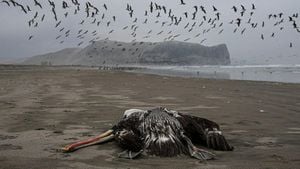Climate change is no longer just a future threat; it's shaping the present and impacting ecosystems across the globe. Recent studies examine how fluctuations in climate and environmental changes are altering the interactions among various species and their habitats. From glaciers to rainforests, what is happening to our planet's delicate balance?
One fascinating contribution to this field of inquiry involves ancient viral genomes. A group of researchers has unveiled insights by studying the DNA preserved within glaciers. The research highlights how viruses, often overlooked, have adapted over the past 41,000 years to changing climatic conditions. The Guliya Glacier on the Tibetan Plateau became the focal point for this exploration.
Scientists from The Ohio State University's Ice Core Paleoclimatology group, including microbiologists and paleoclimatologists, examined ice cores from the glacier, linking viral genomes to specific climate conditions. Their research not only expanded our knowledge of glaciers and their archives but also illuminated the relationships between viruses and their environment.
Through the analysis of metagenomes—a comprehensive collection of the genetic content of microorganisms—the researchers reconstructed viral genomes. The findings revealed the equivalent of 1,705 virus species, greatly increasing the known diversity of glacier-preserved viruses. Interestingly, around 75% of the viral species found did not match any previously documented viruses, indicating the unique microbial community thriving under extreme conditions.
Further analysis showed marked differences between viral communities during cold and warm climatic periods. For example, 11,500 years ago marked the transition to the Holocene epoch, and it was also when the most drastic changes to viral species occurred. Such distinctions imply strong effects of climatic transitions on the types of viruses found, hinting at how environmental stressors can reshape microbial ecosystems.
How do viruses interact with their hosts? The team uncovered some intriguing mechanisms. They identified how viruses target Flavobacterium, prevalent bacteria found within glacial ecosystems. By modifying the genetic make-up of these bacteria, viruses can alter their host's metabolism, using genes to adapt and survive the harsh glacial environment. This not only highlights the viral influence on their hosts but also emphasizes the complex interdependencies within these ecosystems.
With the pace of climate change accelerating, researchers are turning to these ancient interactions as they study the likely trajectories of modern viruses amid current climatic pressures. The interactions reveal what adaptation looks like over extended periods and offer hints about what might happen as the global climate continues to shift.
What can we infer from these findings? The glacier ice acts as more than just a historical record—it is also seen as a valuable resource for climate science, storing data on microbial life and its survival strategies. This is increasingly important as glacier reserves are dwindling due to global warming, leading to concerns about losing these irreplaceable insights.
But it’s not just glaciers at stake; equally concerning are ecosystems like the Amazon rainforest. Here, the intertwining threads of climate change, biodiversity loss, and human activity are creating crises at multiple levels. Fires ignited by both human and natural causes are not only devastating wildlife habitats but are also pumping ultrafine particles and gases high up to the atmosphere. These particles can influence weather patterns and climate on regional and even global scales.
Recent studies have found troubling correlations between the increasing occurrence of fires and the rising temperatures associated with climate change. The smoke from these fires, laden with carbon, contributes to environmental degradation and poses risks to public health.
To paint the full picture, it’s important to recognize how these ecosystems interact. The Amazon, often referred to as the planet's lungs, plays a key role in carbon sequestration. When these forests burn, not only is this function compromised, but the release of stored carbon exacerbates the already precarious situation of global warming.
Some researchers are sounding the alarm about the potential long-term consequences of losing these rich ecosystems. How does climate change shift ecological balances? The direct effects can result from habitat destruction and altered water systems, leading to species migration, alterations in reproduction, and disruptions to food chains.
Migration patterns are already shifting. For example, warmer temperatures are moving birds northward, affecting breeding seasons, food availability, and competition among species. Similarly, aquatic life faces significant shifts as ocean temperatures rise, leading to challenges for fish and other aquatic organisms dependent on stable habitats.
Though the situation appears dire, it's not completely devoid of hope. The interconnectedness of ecosystems means there is potential for resilience and recovery. Conservation efforts aimed at maintaining biodiversity can significantly relieve some of the pressure faced by various species. Restoration activities can help rehabilitate degraded habitats, allowing ecosystems to have the best chance for long-term survival.
Communication and collaborative efforts at local, national, and global levels are now more important than ever. It may seem like facing climate change is overwhelmingly negative, but concerted actions—from legislative measures to grassroots movements—can forge pathways for solutions.
The language of climate science is complex and often inundated with data and projections, but it’s also about storytelling: our ecosystems provide narratives of resilience, survival, and adaptability. By changing the narrative, we can redefine the future of these environments and their inhabitants. The question remains, how will we choose to move forward?
Understanding the past through the lens of ancient viruses and vigilant research on ecosystems is only part of the equation. What we do now, as stewards of the planet, will determine the fate of countless species and geographies.
Each additional year marked by climate change is yet another opportunity to learn and innovate, to contribute to the dialogue about how best to support our ecosystems. The next chapter begins with our commitment to altering the current course—before it’s too late.
Scientists continue to urge for increased funding and resources directed toward climate research. It’s about safeguarding not just our current ecosystems but the legacy we leave behind for future generations. This conversation is not ending; rather, it’s just gaining momentum, and every voice counts.
Climate change impacts every corner of the globe, from the frozen peaks of the Himalayas to the lush landscapes of the Amazon. The ancient viral genomes trapped in glaciers tell stories of survival, of adaptation against the odds. It’s up to society—to you, to me—to heed the lessons learned and take action now for the planet’s future.



